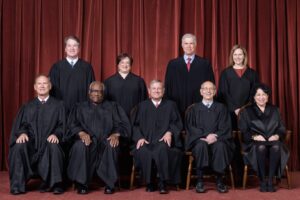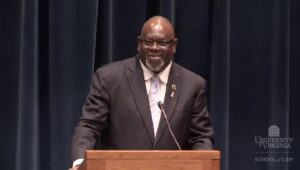By David Pendered
Georgia is in the thick of the abortion access battle being waged at the Supreme Court, which now includes an explicit call for justices to overturn the Roe v. Wade decision.

The nine Supreme Court justices who are slated to hear the Mississippi abortion case are: Front row, left to right: Associate Justice Samuel A. Alito, Jr., Associate Justice Clarence Thomas, Chief Justice John G. Roberts, Jr., Associate Justice Stephen G. Breyer, and Associate Justice Sonia Sotomayor.
Back row, left to right: Associate Justice Brett M. Kavanaugh, Associate Justice Elena Kagan, Associate Justice Neil M. Gorsuch, and Associate Justice Amy Coney Barrett. Credit: Fred Schilling, Collection of the Supreme Court of the United States
Mississippi Attorney General Lynn Fitch submitted a brief July 22 calling on justices to overturn the 1973 Roe ruling, and also a ruling that upholds Roe’s central premise, the 1992 Planned Parenthood of Southeastern Penna. v. Casey:
- “Roe and Casey are thus at odds with the straight-forward, constitutionally grounded answer to the question presented. So the question becomes whether this Court should overrule those decisions. It should.”
Georgia is one of 18 states that have signed a friend-of-the-court brief in the Mississippi appeal of an overturned law that intends to ban virtually all abortions after the 15th week of pregnancy.
The Supreme Court chose the Mississippi case to revisit the abortion issue from among the many restrictive abortion laws states have passed in recent years in hopes of reaching such a hearing. Georgia passed a restrictive abortion law in 2019. A federal judge in Atlanta barred its implementation.
In barring Georgia’s “heartbeat bill,” the judge cited Roe in the ruling issued in July 2020. The formal title of the law, House Bill 481, is Living Infants Fairness and Equality (LIFE) Act. Georgia Attorney General Chris Carr signed the amicus brief in the Mississippi case in July, the same month Georgia’s law was barred. In addition, Georgia has appealed the ruling against its abortion law to the 11th Circuit Court of Appeals, in Atlanta. Oral arguments are set for Sept. 24 and each party is limited to 15 minutes, according to the calendar issued July 1.

Mississippi Attorney General Lynn Fitch has called on the Supreme Court to overturn ‘Roe v. Wade’ and another case that are central to a woman’s access to a legal abortion in the U.S. Credit: ago.state.ms.us
In the Supreme Court case, Sept. 13 is the deadline for the defense to respond to Fitch’s brief, the Jackson Women’s Health Organization, according to a calendar notice.
The Supreme Court is to take up the case in the term that begins Oct. 4. A date for oral arguments hasn’t been set. The case isn’t listed on the current calendar for the court’s first two weeks in October.
Justices have agreed to consider one question in the case, Dobbs v. Jackson Women’s Health Organization, et al.:
- “Whether all pre-viability prohibitions on elective abortions are unconstitutional.”
Mississippi’s brief begins with an introduction that lays out the call for overturning the 1973 Roe v. Wade ruling, which determined that the Constitution protect s a woman’s right to have an abortion prior to the viability of the fetus.
Here are selected highlights from the 49-page document:
From the introduction:
- “On a sound understanding of the Constitution, the answer to the question presented in this case is clear and the path to that answer is straight. Under the Constitution, may a State prohibit elective abortions before viability? Yes. Why? Because nothing in constitutional text, structure, history, or tradition supports a right to abortion. A prohibition on elective abortions is therefore constitutional if it satisfies the rational-basis review that applies to all laws….
- “Roe and Casey are thus at odds with the straight-forward, constitutionally grounded answer to the question presented. So the question becomes whether this Court should overrule those decisions. It should. The stare decisis case for overruling Roe and Casey is overwhelming.
- “Roe and Casey are egregiously wrong. The conclusion that abortion is a constitutional right has no basis in text, structure, history, or tradition….
From the conclusion:
- “Retaining them harms the Constitution, the country, and this Court.”

U.S. District Judge Carlton Reeves rebuked then-President Trump’s criticism of the judiciary as Reeves accepted in 2019 the top award from the University of Virginia’s School of Law. Credit: YouTube, UVA School of Law
Fitch was elected Mississippi’s attorney general in November 2019. Fitch is the first woman elected to the office and the first Republican elected to the office since 1878, according to her profile posted on the Republican Attorneys General Assoc.
The amicus brief signed by Georgia challenges language in the ruling by the federal judge, who is Black, who issued the ruling against Mississippi’s abortion law. The brief calls on justices to “condemn” language in the ruling by U.S. District Court Judge Carlton Reeves, who made observations in footnotes in his ruling that addressed Mississippi’s racial heritage and suppression of abortion access.
The amicus brief does not note that Reeves has history with then President Trump. Reeves had taken on Trump’s criticism of the judiciary in the judge’s 2019 speech at the University of Virginia. Reeves said in prepared remarks, in accepting the Thomas Jefferson Foundation Medal in Law:
- “[W]hen the Executive Branch calls our courts and their work ‘stupid,’ ‘horrible,’ ‘ridiculous,’ “incompetent,’ ‘a laughingstock,’ and a ‘complete and total disgrace,’ you can hear the slurs and threats of executives like George Wallace, echoing into the present.”
"case" - Google News
July 26, 2021 at 04:03AM
https://ift.tt/2VbsjSm
Georgia in Supreme Court abortion case: Explicit call to overturn ‘Roe v. Wade’ - SaportaReport
"case" - Google News
https://ift.tt/37dicO5
https://ift.tt/2VTi5Ee
Bagikan Berita Ini














0 Response to "Georgia in Supreme Court abortion case: Explicit call to overturn ‘Roe v. Wade’ - SaportaReport"
Post a Comment